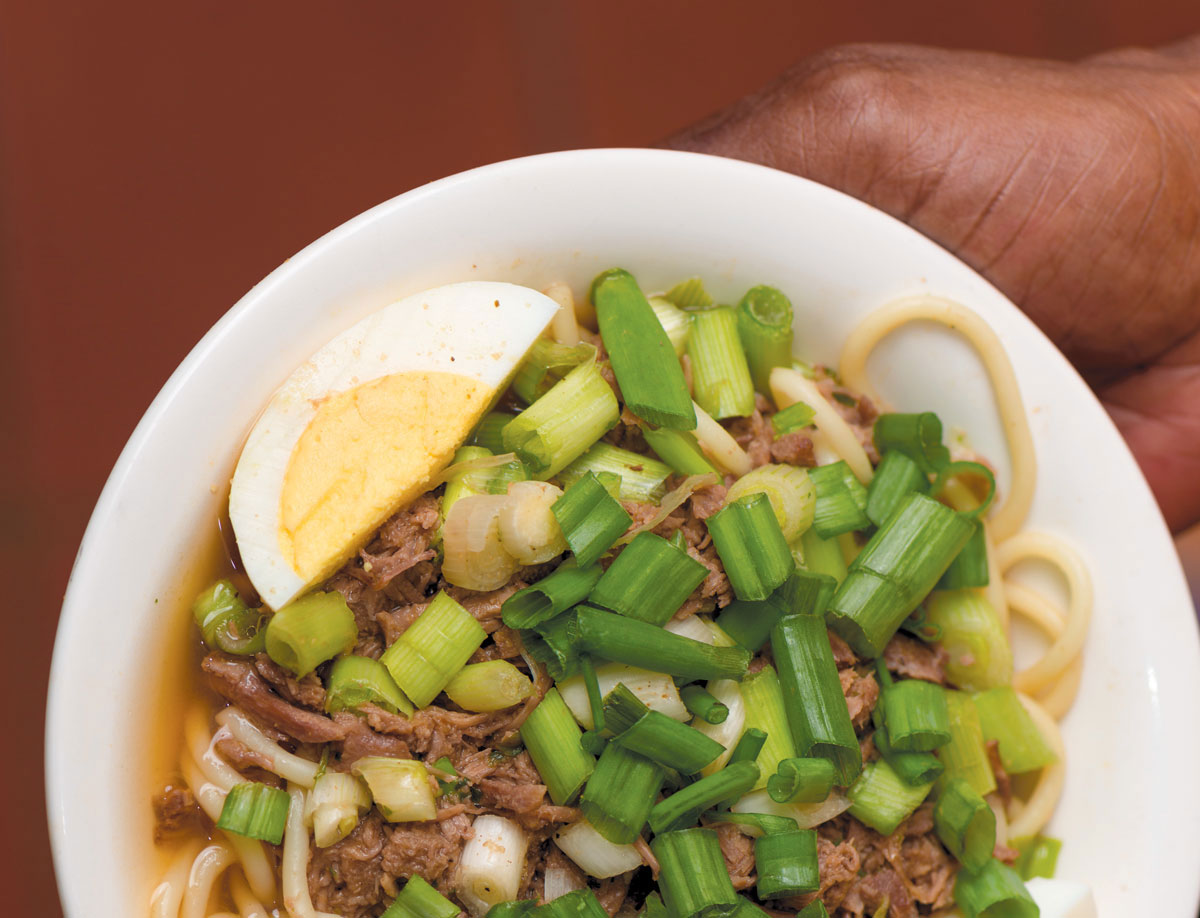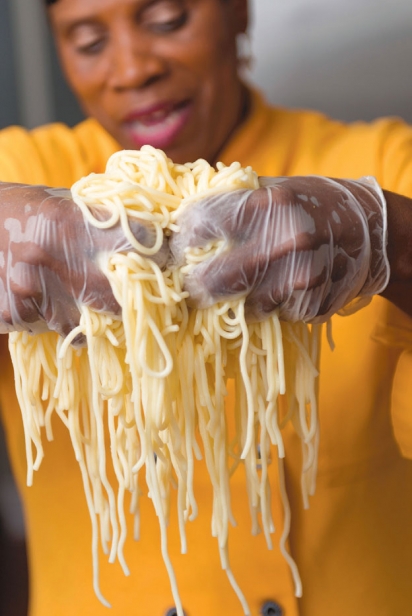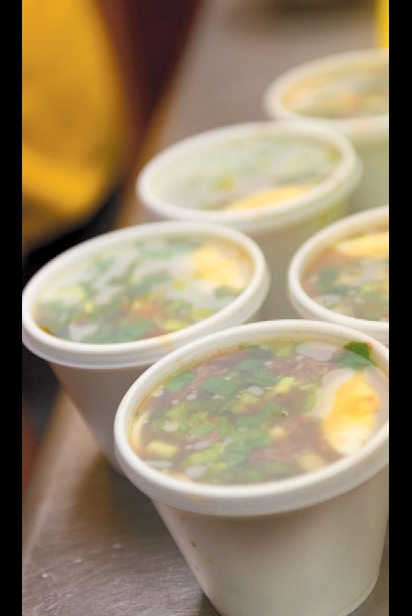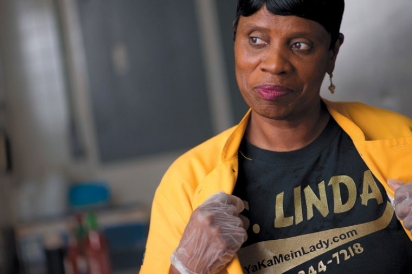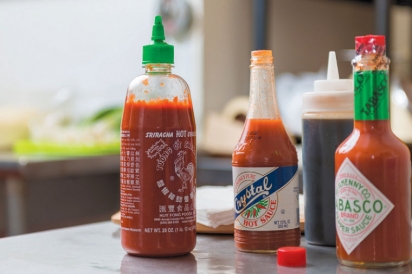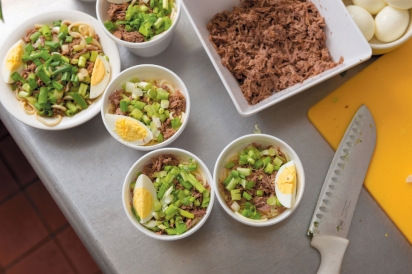Ya-ka-mein: Old Sober
NEW ORLEANS SOUL FOOD OUT OF CHINATOWN
Each step I took into the Ogden Museum of Southern Art hurt worse than the one before. I moved lethargically and my headache had contractions. I plopped on a bench, away from the music and people gathered there on a Thursday night, almost two years ago. Even the lights hurt my eyes. But I knew something was truly amiss when I declined a bourbon on the rocks—offered by the museum’s director, who knew my affinity for the drink. All day, not water, a nap or even aspirin had made me feel better. Then, I paid $5 for a savory elixir dipped from a slow cooker and served in a Styrofoam cup: Miss Linda Green’s ya-ka-mein.
I wasn’t drunk or hungover, but that day, it was my Old Sober. For the past 19 years, Green has served her dish of spaghetti noodles, beef and green onions in a spice-filled broth topped with half of a hard-boiled egg. As I ate and sipped the goodness, I grew stronger by the second; it was Popeye the Sailor’s can of spinach. Shortly thereafter, the dish proverbially transported me back to my youth.
I spent a lot of my childhood on North Broad and Saint Phillips streets, the Sixth Ward, where my parents owned Le Earth Florist & Balloons and second lines often passed on Sundays. A few doors down was Manchu’s, a carry-out-only Chinese food place where I feasted on egg foo young, Saint Paul sandwiches and ya-ka-mein. My folks introduced me to the dish; for them, it was a quick snack on long days. For Green and so many other residents of the city, the dish dates back to their youth, family and neighborhood barrooms. And at those lounges, deep in those black communities, where the sounds of rhythm and blues reverberated around the walls and soul food was served from the kitchen, the legend of Old Sober was born.
“It was a unique dish. It was always a poor man’s dish,” Green said. “It was leftovers.”
Green, who’s known as “The Ya-ka-mein Lady,” is 57 and grew up in Central City. Her mother taught her to make Old Sober when she was about 10. In the early 1970s, they lived in the 2600 block of Danneel Street, next to the Bean Brothers Lounge, which was owned by close friends of Green’s family. Her mother, Shirley Green, often held court on her porch and chatted with people headed into the bar. Though she also sold fried fish, potato salad and stewed hen, it was her that ya-ka-mein was revered.
“I told her she couldn’t take it with her and she had to give me that recipe,” Green said. “And I’m grateful that she did.” She added that food writers have perpetually tried to trace the origins of the dish. One theory has it coming from the extinct Chinatown, in New Orleans, where Chinese immigrants from California resided while building the railroads to Houston. Conversely, others believe the meal was introduced by black troops who fought in the Korean War and returned home with a hankering for the soupy noodle dishes they ate while deployed.
Green thinks it’s the black soldiers. “But we know it comes from New Orleans,” she said.
Green asserts that ya-ka-mein has been one of New Orleans’s best-kept secrets. She recalls meeting blacks and whites who still hadn’t heard of it though they were born here. Her version of the dish converts even the most doubtful eaters.
“Once it hits the palate, it goes to that part of the brain,” she said, “and once it hits the brain, it goes right back to the palate and it wants more.”
Before Green started selling ya-ka-mein at second lines in 1996 from her gray and black Chevy Blazer, it was difficult to find.
She reminisced about the ’70s, when Old Sober was sold at a bevy of Central City barrooms including Sam’s, Byron’s and Pete’s; all are shuttered now and the building that housed Byron’s is a church. Green says from 1940s, until the ’80s, from Danneel and Jackson, it was a bar on every corner all the way to Louisiana Avenue, with names like Big Time Crip, Mrs. Breaux, Jim’s and Henry Three Way. Some of the joints changed names and owners, but most of them went dark. She can’t identify a singular reason for the closures, but said she thinks many were family owned and the later generations didn’t want to take the business over.
“They did their own thing,” Green said of some children who spurned the family bar business. “Those kids went to college and they made a career for themselves.”
My family’s business was flowers; I went from cleaning to blowing up balloons and then making deliveries. I attended college in hopes of taking over the enterprise—my father, LeRoy Harris, encouraged me to pursue other endeavors. He grew up in Scotlandville, outside of Baton Rouge, where there were few bars in the late 1950s and ’60s and none of them served ya-ka-mein. However, he still managed to get a taste of New Orleans. My father, 72, frequented Marico’s around 1964, a bar he described as middle class because it was frequented by a lot of professors from nearby Southern University.
“That place used to be popping. That’s when AFO was at the top of their game,” he said, referring to All For One, the New Orleans–based record label, founded by Harold Battiste Jr., and featuring top jazz musicians from the city. “I was too young to go into the club, so we used to watch them through the kitchen window.”
He moved to New Orleans a few years later and got his ya-ka-mein from Charlie’s Corner and Joy Tavern in Gert Town, among other places.
“Everybody did it differently, some was good and some was trash,” he recalled. “Seriously.”
My father says most of the bars downtown didn’t offer ya-ka-mein and only sold smoked sausage with mustard and crackers. “Maybe they didn’t have real cooks.”
Now, across the city, with the proliferation of food trucks, “real cooks” have become mobile. The downtown food options at barrooms have burgeoned well beyond boiled sausage and crackers. In the seventh ward, you can dine on ya-ka-mein outside of Bullet’s Sports Bar on a Tuesday and get fried fish at Seal’s Class Act Bar during the weekend. On a surprisingly cool night in May, Patrice Gordon parked on the corner of North Johnson and Lapeyrouse, across the street from Josie’s Playhouse “Home of Magic Monday” to serve patrons of the barroom and other nocturnal eaters.
She hauled a white trailer around with a navy Dodge truck. Her menu was scribbled on a small dry-erase board and included hot sausage, cheeseburgers, fries and pork chops and chicken plates; at the very bottom was “yaki-mein” for $8.
“Right after the storm, everyone was getting super drunk,” she said referring to Hurricane Katrina in 2005. She saw an opportunity to provide comfort for the increased consumption and had her aunt teach her how to make Old Sober. Gordon grew up in Vascoville, one of the three villages in the Gentilly neighborhood of New Orleans, and celebrated the city’s cultures and is now a big queen with the Golden Blades Mardi Gras Indians.
Like Green and others attest, Gordon said the dish is simple. “But the spiciness of it brings you down and stops you from vomiting all of yourself after you get hungry,” she quipped.
Gordon walked across the street and delivered a plate of food.
Inside the barroom, colorful lights flashed against the red colored walls and mirrors, a few couples danced as others sipped drinks and watched the highlights of the NBA playoffs. In the back room, the game on the pool table was the main draw. A bartender explained that all drinks are $5 on Magic Monday and usually it’s all bounce music. That night, it was a mature crowd and the DJ played oldies.
Johanna Valdery, 46, has owned the bar since November 2014. She worked the kitchen for three years when it was named Mickey’s Playhouse. Valdery’s parents owned bars and restaurants and she has been in the business for 16 years. She said the kitchen will reopen soon at her place, but most neighborhood spots are not equipped to have full kitchens.
“And they just don’t want the hassle of getting the permits,” she said of bar owners. She added that is one of the reasons Old Sober is sold from food trucks far more often than the actual bar.
Green said she doesn’t mind that more food trucks are starting to sell ya-ka-mein at bars and second lines. The food scene in New Orleans continues to evolve—but people drinking will always be consistent. She explained that the city is about food and having a good time and has been for hundreds of years with different influences. In recent years, Vietnamese restaurants have boomed in the city.
“People have asked me if I noticed the number of new pho places popping up,” she said referring to a type of Vietnamese soup made with beef stock, spices and noodles. “The more the merrier, but it don’t taste like ya-ka-mein.”


